Have you ever felt anxious for no reason? Like something bad is about to happen, even though you can’t explain why? You might be experiencing subconscious anxiety.
Subconscious anxiety is a form of anxiety that exists below the surface of conscious awareness. This means that people may not even realize that they are anxious. Instead, they may feel a general sense of unease or worry that they can’t seem to shake.
If subconscious anxiety is left untreated, it can lead to more serious problems, such as depression or panic attacks. But there are things that people can do to manage subconscious anxiety and live a healthy, balanced life.
What Is Subconscious Anxiety
Subconscious anxiety is the kind of anxiety that we’re not even aware of. It’s the little voice in the back of our heads that’s always telling us we’re not good enough, or that we’re going to fail.
It’s the feeling that we’re not worthy of love or success. Subconscious anxiety can be debilitating, because it’s always there, lurking in the background. It can prevent us from taking risks or pursuing our dreams because we’re afraid of what might happen.
Rather it causes us to dwell on negative thoughts, magnify our worries, and make rash decisions. It can also lead to avoidance behaviors, such as avoiding social situations or not taking risks. Subconscious anxiety is a normal human emotion, but it can become problematic when it starts to interfere with our daily lives.
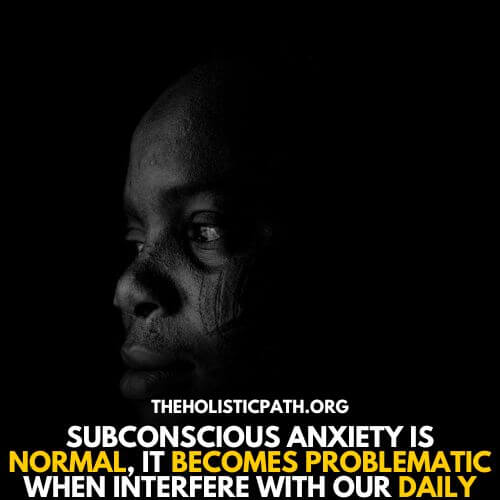
Different Types Of Subconscious Anxiety
There are different types of subconscious anxiety that can affect us in different ways. Here few common types of subconscious anxiety:
1. Social Anxiety
Social anxiety is subconscious anxiety that leads to avoidance behavior. It can be caused by a number of things, including genetics, environment, and trauma. People with social anxiety often feel like they are being judged, or that they are not good enough.
This can lead them to avoid social situations or to feel extremely anxious about them. This fear can be so debilitating that it can lead to Avoidant Personality Disorder, which is an avoidance disorder that includes avoiding work, school, and other activities.
2. Health-Related Anxiety
Subconscious anxiety can take many different forms. For some people, it manifests as a fear of an impending health crisis, even in the absence of any real threat.
We all tend to worry about our health from time to time. But for some people, health-related anxiety can become a subconscious form of anxiety. Health-related anxiety is a type of anxiety that is focused on health and well-being. It can cause people to worry excessively about their health, even when there is no reason to do so.
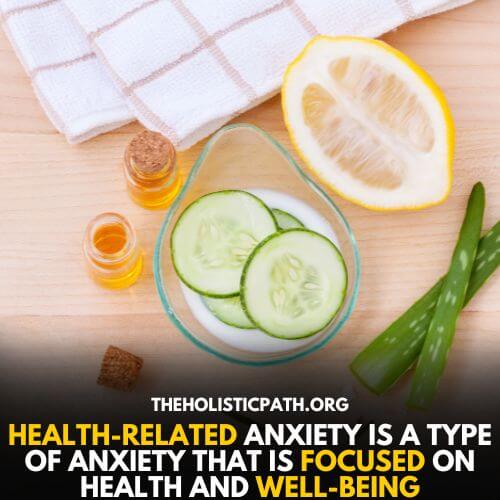
This type of anxiety can be very debilitating, causing sufferers to focus on their health to the exclusion of all other concerns. In extreme cases, it can even lead to developing hypochondria. Subconscious anxiety is often triggered by a traumatic event or a major life change, such as becoming a parent.
However, it can also be sparked by more mundane things, such as seeing a news report about a deadly disease. No matter what its cause, subconscious anxiety can be a very real and very distressing condition.
3. Agoraphobia
Agoraphobia is a form of anxiety that can be subconscious. It is characterized by a fear of being in situations where escape might be difficult or embarrassing, or where help might not be available if needed. Agoraphobia often leads to an avoidance of crowds, open spaces, or public transportation. People with agoraphobia may also experience panic attacks.
It prevents people from leaving their homes or comfort zones. Agoraphobia may be the result of subconsciously associating leaving home with anxiety or negative experiences. Whatever the cause, agoraphobia can have a significant impact on a person’s life, making it difficult to work, socialize, or even leave the house.
4. Specific Phobias
Most people have heard of specific phobias, like arachnophobia (fear of spiders) or claustrophobia (fear of enclosed spaces). But what you may not know is that these phobias are actually a form of subconscious anxiety. In other words, they serve as a way for your mind to protect you from something that it perceives as dangerous.
Of course, these subconscious protection mechanisms can sometimes go a little too far.
For example, someone with claustrophobia may avoid busy elevators or crowded restaurants, even though there is no real danger involved. Similarly, someone with arachnophobia may go out of their way to avoid spiders, even though most species are harmless.
Symptoms Of Subconscious Anxiety
The symptoms of subconscious anxiety can be hard to spot. After all, it’s not like you can just ask your subconscious how it’s feeling. However, there are a few tell-tale signs that can indicate that something is wrong:
1. Getting Distracted
Have you ever found yourself unable to focus on a task, even though you know it’s important? Or been distracted by thoughts or worries that seem to come out of nowhere? If so, you’re not alone. This is a common symptom of subconscious anxiety.
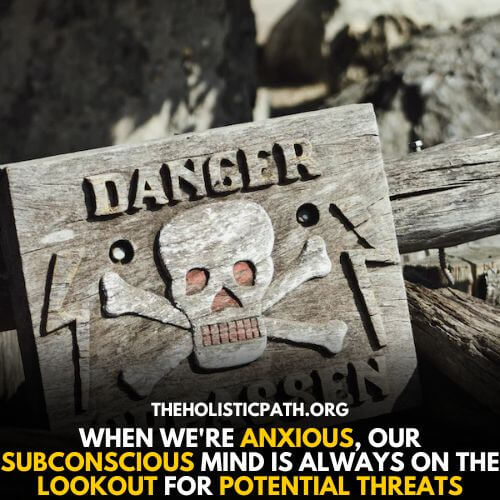
When we’re anxious, our subconscious mind is always on the lookout for potential threats. This can make it hard to focus on anything else. Our thoughts may start to race, and we may find ourselves ruminating on things that are worrying us.
We may also startle more easily, or feel jumpy and on edge.
All of these symptoms can interfere with our ability to concentrate and get things done.
2. Being Disorganized
Being disorganized can be a symptom of subconscious anxiety. When we’re anxious, our brain is in overdrive, trying to process all the information and stimuli it’s bombarded with. This can lead to us feeling overwhelmed, and as a result, we may start to feel like we’re not in control of our lives.
One way this manifests is through disorganization. We might forget important deadlines, misplace things, or have trouble keeping track of our thoughts. If you find yourself feeling frequently disorganized, it might be worth considering whether you’re subconsciously anxious.
While it’s not always easy to control our subconscious minds, there are some things we can do to try and ease our anxiety, such as practicing mindfulness or seeking professional help.
3. Decision Making Becomes Difficult
Many of us have experienced difficulty making decisions at one time or another. For some, this may be an occasional thing, while for others it may be a more persistent problem. There are many possible causes of difficulty in making decisions, but one of them may be subconscious anxiety.
Subconscious anxiety can manifest in a variety of ways. For some people, it may show up as procrastination or indecision. They might avoid making decisions altogether, or take a long time to reach a decision because they’re second-guessing themselves.
Subconscious anxiety can also lead to “analysis paralysis” – when someone gets caught up in trying to over-analyze a situation and ends up not being able to move forward.
4. You Feel Emotionally Overwhelmed
Being emotionally overwhelmed is a symptom of subconscious anxiety. When we’re subconsciously anxious, our bodies go into fight-or-flight mode, which means that we’re on high alert and ready to defend ourselves.
This can lead to us feeling overwhelmed by our emotions. We might feel like we’re in danger, or like we can’t handle what’s happening. This can be a really scary feeling, but it’s important to remember that it’s just our body’s way of trying to protect us.
5. Rumination
Rumination is a symptom of subconscious anxiety. When someone experiences subconscious anxiety, they may find themselves thinking about their worries or concerns on a constant basis.
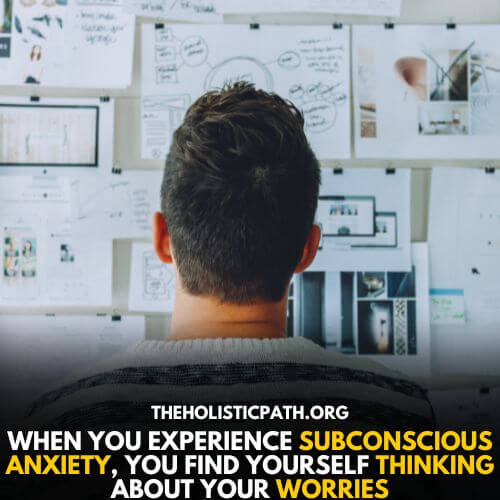
This can lead to a feeling of being “stuck” in their own thoughts, and they may have difficulty focusing on anything else. Rumination can be triggered by stressful events or situations, and it can often be accompanied by other symptoms of anxiety such as insomnia, fatigue, and irritability.
6. Perfectionism
Perfectionism is often seen as a desirable trait. After all, who wouldn’t want to be perfect? But what many people don’t realize is that perfectionism is often a symptom of subconscious anxiety. When we’re anxious, our brain tells us that we need to be perfect in order to be accepted and loved.
We start to believe that if we can just get everything right, then we’ll finally be happy. Of course, this is an impossible standard to live up to, which only makes our anxiety worse. In the end, perfectionism is a self-destructive cycle that can be difficult to break free from.
7. Pessimism
Pessimism is often seen as a negative personality trait, but it can also be a symptom of subconscious anxiety. When we’re anxious, our brain goes into self-preservation mode and starts to look for danger everywhere. This can lead us to focus on the negative and ignore the positive.
We may start to see problems where there are none and magnify the ones that do exist. As our Anxiety mounts, we may become close-minded and resistant to new ideas or solutions. We may withdraw from others and start to believe that things will never get better.
Physical And Emotional Symptoms
Subconscious anxiety can manifest in a variety of physical symptoms, including:
- Difficulty breathing.
- Tightness in the chest or throat.
- A racing heart or feeling like your heart is skipping a beat.
- Sweating or hot flashes.
- Trembling or shaking.
- Feeling dizzy or lightheaded.
- Feeling nauseous or like you need to vomit.
- Feeling like you need to go to the bathroom even if you don’t have to go.
- Headache or neck pain.
- Fatigue or Trouble sleeping.
Subconscious anxiety can also cause emotional symptoms, such as:
- Feeling restless, irritable, or on edge.
- Feeling hopeless, helpless, or out of control.
- Difficulty concentrating or mind going blank.
- Increased worry or fearfulness.
- Avoidance behaviors. (e.g., avoiding people, places, or things that trigger anxiety)
Other Issues Caused By Subconscious Anxiety
There are many other symptoms of subconscious anxiety that people may experience. Some common symptoms include:
1. Panic Disorder
We all experience anxiety at some point in our lives. For some of us, anxiety is caused by a specific event or situation, such as public speaking or an upcoming deadline. For others, anxiety is more general and hard to pinpoint.
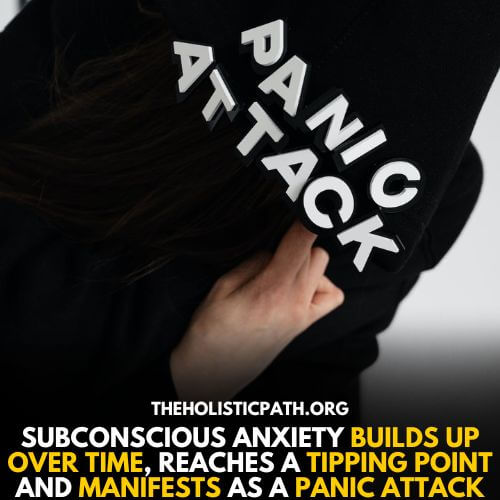
This subconscious anxiety can build up over time until it reaches a tipping point and manifests as a panic attack. Panic attacks are sudden, intense episodes of fear or discomfort that can cause physical symptoms, such as a racing heart and shortness of breath.
Once someone has experienced a panic attack, they may start to worry about having another one, which can lead to the development of panic disorder. In other words, subconscious anxiety can be a major trigger for both panic attacks and panic disorder.
2. Sleep-Related Problems
For many people, anxiety is a subconscious thing. It’s there all the time, even when we’re not aware of it. And it can have a big impact on our sleep.
Subconscious anxiety can cause us to wake up frequently during the night, or to have difficulty falling asleep in the first place. It can also lead to restless sleep and nightmares.
If you’re struggling with sleep-related problems, it’s worth considering whether subconscious anxiety might be playing a role.
3. Depression
It’s no secret that anxiety and depression often go hand-in-hand. But what many people don’t realize is that subconscious anxiety can actually be a major trigger for depression.
When we’re subconsciously anxious, we’re constantly on edge, feeling like something bad is about to happen. This can lead to persistent worry, irritability, and sleep problems. Over time, this subconscious anxiety takes a toll on our physical and mental health, paving the way for depression.
4. ADHD
It’s well-known that anxiety can cause a whole host of problems, both physically and mentally. But did you know that subconscious anxiety can also be a factor in ADHD? Subconscious anxiety is when we’re anxious about something, but we’re not even aware of it.
It can manifest as physical symptoms (like a racing heart or sweating) or mental ones (like being easily distracted or having difficulty concentrating). Because we’re not consciously aware of the anxiety, it can be hard to manage. And when left unchecked, subconscious anxiety can lead to ADHD.
Causes Of Subconscious Anxiety
Subconscious anxiety can have many different causes. Here are a few of the most common:
- Subconscious anxiety can be caused by unresolved trauma from the past. This could be something as major as childhood abuse or neglect, or something as minor as a car accident.
- Subconscious anxiety can also be caused by toxic relationships. If you’re constantly surrounded by negativity, it’s only natural that you would start to feel anxious.
- Subconscious anxiety can also be caused by chronic stress. If you’re always under pressure at work or home, your body will start to feel the effects.
- Another common cause of subconscious anxiety is poor self-care. If you’re not taking care of yourself, both physically and emotionally, it’s only natural that you would start to feel anxious.
- Finally, subconscious anxiety can also be caused by genetics. If you have a family history of anxiety or other mental health disorders, you may be more likely to experience subconscious anxiety yourself.
Practical Tips on Dealing With Subconscious Anxiety
Subconscious anxiety can be a real drag. It can make you feel tense and stressed, even when there’s nothing specific to worry about. If you’re struggling with subconscious anxiety, here are a few things that may help:
1. Talk To Someone You Trust About Your Anxiety
It’s no secret that anxiety can be tough to deal with. But did you know that talking to someone you trust about your anxiety can actually help? Here’s how:
- By talking about your anxiety, you’re bringing it into the conscious part of your brain. This can help you to better understand your anxiety and figure out what triggers it.
- Talking to someone you trust can help you to feel more supported and less alone. This can in turn help to reduce your anxiety.
- When you talk about your anxiety, you’re also helping to normalize it. This can make it feel less overwhelming and more manageable.
So if you’re feeling anxious, don’t hesitate to reach out to someone you trust. It could end up helping more than you realize!
2. Identify Your Triggers
Triggers are the things that subconsciously cause us to feel anxiety. Sometimes we’re not even aware of what our triggers are, which can make dealing with anxiety difficult. However, identifying our triggers can help us to manage our anxiety in a more effective way.
When we know what causes our anxiety, we can try to avoid those triggers or we can be prepared to deal with them in a healthy way. For example, if you know that being in large crowds makes you anxious, you can Avoid situations where you’ll be in a large crowd.
Or, if you’re aware that you start to feel anxious when you haven’t eaten in a while, you can make sure to keep snacks with you always. Dealing with subconscious anxiety can be tough, but identifying your triggers is a good first step.
3. Challenge Your Anxious Thoughts
Challenging our anxious thoughts can help us deal with subconscious anxiety. Here’s how:
- When you notice an anxious thought, stop and question it. What evidence do you have to support it? Is it really true?
- Try to come up with a more realistic, positive thought to replace the anxious one. For example, “I’m not good enough” could be replaced with “I’m doing my best.”
- Regularly practice mindfulness and self-compassion. Allow yourself to be kind and understanding towards yourself, even if you make a mistake. This will help to create a more positive internal dialogue overall.
By challenging our anxious thoughts and replacing them with more realistic and positive ones, we can start to deal with our subconscious anxiety in a more effective way.
Mindfulness and self-compassion are also key in this process. So next time you’re feeling anxious, try out these tips and see how they help you!
4. Practice Relaxation Techniques
Subconscious anxiety can be a tricky thing to deal with. It’s often the root of our worries and fears, and it can be tough to pin down exactly what’s causing it. However, there are a few things you can do to help ease subconscious anxiety. One is to practice relaxation techniques.
This could involve something as simple as taking some deep breaths or spending a few minutes in meditation. By taking some time to relax and clear your mind, you can help reduce the ‘noise’ of subconscious anxiety.
5. Get Enough Sleep
If you’re struggling with anxiety, you might be looking for ways to cope. Getting enough sleep is one of the best things you can do. Here’s why:
- When you’re well-rested, you’re better able to deal with stressful situations. Your body is more resilient and your mind is sharper.
- Sleep gives your body a chance to recover from the day. It’s like resetting your system.
- Getting enough sleep helps you to maintain a healthy weight. This is because sleep deprivation can lead to increased levels of the hormone cortisol, which can promote weight gain.
- Sleep helps to reduce inflammation in the body. This is important because chronic inflammation has been linked to a variety of health problems, including heart disease, arthritis, and cancer.
So if you’re struggling with anxiety, make sure you’re getting enough Shut-Eye. It might not be a cure-all, but it can certainly help!
6. Exercise
One natural method is exercise. Exercise releases endorphins, which have mood-boosting properties. Endorphins also act as a natural painkiller, helping to alleviate the physical symptoms of anxiety.
It helps to release tension and relax the body, it can improve your mood and make you feel more positive, and it can help to clear your mind and give you some time to focus on something else.
Regular exercise can help to reduce the risk of developing anxiety disorders in the future.
7. Address Underlying Mental Health Issues
Subconscious anxiety can manifest in a variety of ways, from somatic complaints to chronic stress. Addressing the underlying mental health issues can help deal with subconscious anxiety. For example, therapy can help to identify and work through any past traumas that may be triggering anxiety.
Medication can also be used to address imbalances in neurotransmitters. In addition, self-care practices such as yoga, meditation, and journaling can help to ease anxiety. By addressing the underlying causes of subconscious anxiety, it is possible to find relief from the symptoms.
8. Avoid Overscheduling Yourself
Most of us lead pretty busy lives. We often have a lot of things on our plates, and it can be tough to keep up with everything. As a result, we can subconsciously start to feel anxious about all the things we have to do.
This anxiety can manifest in different ways, such as difficulty sleeping, feeling tense or irritable, or having trouble concentrating. If you find yourself feeling like this on a regular basis, it might be worth reconsidering your schedule.
Make sure you’re taking some time for yourself every day, even if it’s just for a few minutes. You might also want to try cutting back on some of your commitments. Over-scheduling yourself can lead to subconscious anxiety, so try to create some space in your life for relaxation and self-care.
9. Journaling
Sometimes, the things that make us anxious are buried deep in our subconscious mind. We may not even be aware of what is causing our anxiety, but it can still have a profound effect on our day-to-day lives. One way to help deal with subconscious anxiety is to keep a journal.
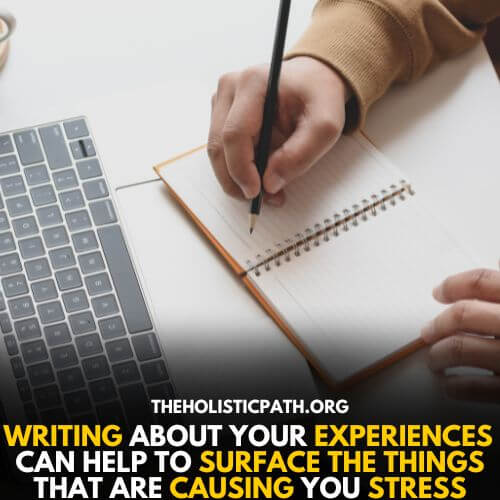
Writing about your experiences and thoughts can help to surface the things that are causing you stress. Once you identify the source of your anxiety, you can begin to address it directly. In addition, journaling can provide an outlet for your emotions, helping you to feel calmer and more balanced.
So if you’re feeling anxious, try picking up a pen and putting your thoughts down on paper. It just might help to ease your mind.
10. Make Time For Fun And Enjoyable Activities
Subconscious anxiety can be frustrating. It’s the feeling that something bad is going to happen, even though you can’t quite put your finger on what it is. It can be tough to shake, and it can really interfere with your life.
But one way to help deal with subconscious anxiety is to make time for fun and enjoyable activities.
Doing things that make you happy can help take your mind off of whatever it is that’s causing your anxiety. And when you’re having fun, you’re not as focused on whatever it might be that’s making you anxious.
So go ahead and plan that girls’ night out, or sign up for that art class you’ve always wanted to take. Taking some time for yourself and doing things that make you happy can go a long way in helping to deal with subconscious anxiety.
Treatments For Subconscious Anxiety
Treating subconscious anxiety can be difficult because it’s often hard to identify the root cause of the anxiety. However, there are a few treatment options that can be effective:
1) Cognitive-behavioral therapy:
Cognitive behavioral therapy (CBT) is a type of psychotherapy that can be used to treat subconscious anxiety. CBT focuses on changing negative thoughts and behaviors that are contributing to anxiety.
The therapist works with the client to identify these thoughts and behaviors and then develops a plan to change them. CBT can be done in individual or group sessions, and it usually lasts for 10-20 weeks.
Some people may need more than one round of CBT to achieve lasting results. Research has shown that CBT is an effective treatment for subconscious anxiety, and it can provide long-term relief from symptoms.
2) Exposure therapy:
Most people are subconsciously anxious about something. It might be a fear of public speaking, of heights, or spiders. Whatever the cause, this subconscious anxiety can have a big impact on our lives. It can make us avoid certain situations, or make us feel constantly on edge.
Exposure therapy is one way to deal with subconscious anxiety. The idea is to gradually expose yourself to the thing that you’re afraid of. For example, if you’re afraid of public speaking, you might start by talking to one person, then five people, and so on.
The goal is to desensitize yourself to the thing that you’re afraid of and eventually overcome your subconscious anxiety. While it’s not always an easy process, exposure therapy can be an effective way to deal with subconscious anxiety.
3) Relaxation techniques:
Relaxation therapy can be employed to deal with subconscious anxiety. This type of therapy can help to alleviate the symptoms of anxiety by helping the person to relax and to focus on positive thoughts and images.
The aim of relaxation therapy is to help the person to reach a state of deep relaxation, where they are free from worry and stress. There are a number of different techniques that can be used in relaxation therapy, including progressive muscle relaxation, guided imagery, and biofeedback.
Relaxation therapy is typically conducted by a trained therapist, but it can also be learned and practiced at home.
4) Mindfulness-based therapies:
Subconscious anxiety can be a tricky thing to deal with. On the one hand, it’s hard to pin down and identify the source of the anxiety. On the other hand, it can be very debilitating and make it difficult to go about your daily life.
Mindfulness therapy can be a helpful way to deal with subconscious anxiety. The aim of mindfulness therapy is to help you become more aware of your thoughts and feelings, without judgment. This helps people to become more in touch with their own emotions and learn to manage them in a healthy way. Which in turn can help to break the cycle of negative thinking, and allow sufferers to develop a more positive outlook on life.
This can help you to identify the source of your anxiety and start to deal with it in a more constructive way. Mindfulness therapy can also help you to learn how to better manage stress and relax your body and mind.
If you’re looking for a way to deal with subconscious anxiety, mindfulness therapy could be worth considering.
5) Psychotherapy:
When it comes to subconscious anxiety, psychotherapy can be a helpful tool. By talking openly about your anxiety with a therapist, you can start to understand the root cause of your anxiety and work on addressing it.
In addition, therapy can provide you with coping and stress-management skills to help you deal with anxiety in a healthy way. Furthermore, therapy can help you to develop a support system of people who understand what you’re going through and can offer encouragement.
If you’re struggling with subconscious anxiety, consider reaching out to a therapist for help.
Takeaway
Subconscious anxiety is a real phenomenon that can have a negative impact on our lives. However, there are ways to deal with it and minimize its effects. If you think you might be suffering from subconscious anxiety, it’s important to talk to a professional about it. With the right help, you can learn to manage your anxiety and live a happier, healthier life.
